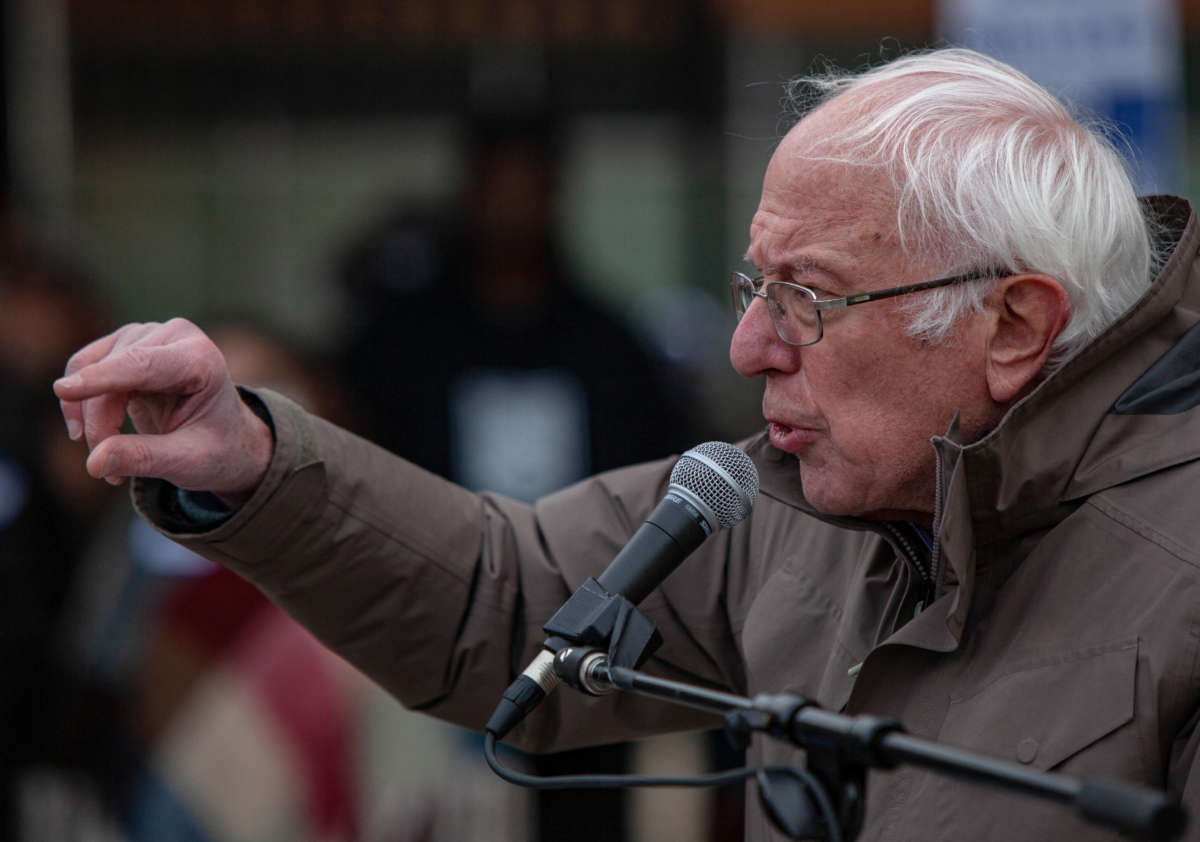Truthout is an indispensable resource for activists, movement leaders and workers everywhere. Please make this work possible with a quick donation.
On Wednesday, Sen. Bernie Sanders (I-Vermont) demanded on the Senate floor that the chamber immediately take up debate on his and Sen. Amy Klobuchar’s (D-Minnesota) new bill to lower prescription drug prices – but the effort was blocked by a pharmaceutical industry-backed Republican senator.
Sanders and Klobuchar asked for unanimous consent for the Senate to debate and vote on the Cutting Medicare Prescription Drug Prices in Half Act, which would allow Medicare to access the same low drug prices that are enjoyed by the Department of Veterans Affairs.
This would save some Medicare recipients hundreds or thousands of dollars monthly, depending on their medical needs. According to a Government Accountability Office report from 2020, Veterans Affairs’s prices are 49 percent lower for name brand drugs and 68 percent lower for generic drugs.
“For decades, literally decades – 20, 30, 40 years – members of both political parties have come to the floor of the Senate, come to the floor of the House, and they have bemoaned the high cost of prescription drugs in this country,” Sanders said in an impassioned speech on the House floor. “For decades now, members of Congress have been talking about lowering the cost of prescription drugs. And for decades they have failed to deliver. Talk, talk, talk. Nothing happens.”
Growing wealth inequality during the pandemic – which has now killed over 900,000 Americans – has demonstrated the urgency of making prescription drugs more accessible, Sanders continued. He also pointed out that rising prices for essentials like prescription drugs, which cost more in the U.S. than in any other country, are making it harder for lower- and middle-income families to survive.
“During this pandemic alone, just the last few years, the billionaire class saw an increase in their wealth by some $2 trillion,” he said. “While at the same time, thousands of workers died as they went to their jobs. They didn’t have a choice about it. They went to work, and they died.”
Republican Sen. Mike Crapo (Idaho) blocked the effort, complaining that it would add “more bureaucracy.” Over the past election cycle, Crapo has received nearly $300,000 from the pharmaceutical industry.
Democrats and progressives have been aggressively pursuing legislation to lower prescription drug prices. Sanders fought for months to include drug price reforms in the Build Back Better Act, making calls and introducing bills to move the issue along.
Eventually, the prescription drug pricing plans were watered down, thanks to opposition from pharmaceutical industry allies like Sen. Joe Manchin (D-West Virginia) and Sen. Kyrsten Sinema (D-Arizona), along with a group of conservative Democrats in the House whose top donors are the pharmaceutical and health care industry.
Then – after a pharma-funded group hosted Democratic staffers at a retreat in November – the Build Back Better Act died an unceremonious death after months were wasted on negotiations.
Though prescription drug pricing proposals face opposition from pharma-funded lawmakers from both sides of the aisle, polls find that such bills are overwhelmingly popular with the American public. In October, a CBS News poll found that 88 percent of Americans support lowering prescription drug prices using federal funding.
This is likely because millions of Americans can’t afford to buy drugs that have been prescribed to them. In a Gallup poll from last year, about 10 percent of adults living in low-income households reported skipping pills in order to save money.
Not only are drug prices higher in the U.S. than in other countries, the problem has also been worsening over time. This year, pharmaceutical companies raised drug prices by an average of 6.6 percent, hiking costs for 866 drugs.
Part of the reason why it’s so difficult to move drug pricing reform through Congress is because the pharmaceutical industry is perhaps the single most powerful industry in politics. Last year, it spent nearly $353 million on lobbying, the most of any industry. This is nearly double the amount spent by the electronics manufacturing and equipment industry, which spent the second-most on lobbying in 2021, shelling out a total of $185 million.
A terrifying moment. We appeal for your support.
In the last weeks, we have witnessed an authoritarian assault on communities in Minnesota and across the nation.
The need for truthful, grassroots reporting is urgent at this cataclysmic historical moment. Yet, Trump-aligned billionaires and other allies have taken over many legacy media outlets — the culmination of a decades-long campaign to place control of the narrative into the hands of the political right.
We refuse to let Trump’s blatant propaganda machine go unchecked. Untethered to corporate ownership or advertisers, Truthout remains fearless in our reporting and our determination to use journalism as a tool for justice.
But we need your help just to fund our basic expenses. Over 80 percent of Truthout’s funding comes from small individual donations from our community of readers, and over a third of our total budget is supported by recurring monthly donors.
Truthout has launched a fundraiser to add 432 new monthly donors in the next 7 days. Whether you can make a small monthly donation or a larger one-time gift, Truthout only works with your support.
